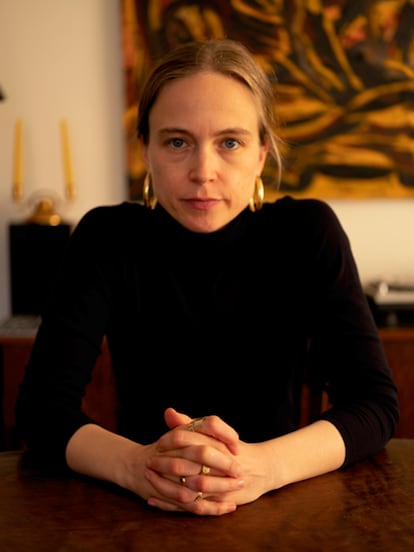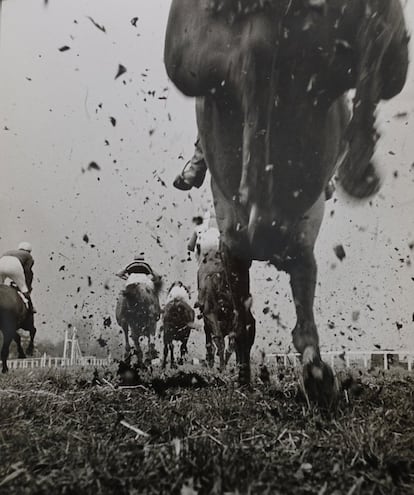Kathryn Scanlan’s great literary derby
In ‘Kick the Latch,’ the Iowa author reconstructs a hard, wild and tender life among horses

Four hours of conversation in one sitting followed by a few more chats a while later, all during the middle of the pandemic, all over the phone — that’s how Kathryn Scanlan (Iowa, 43) found the pieces that she assembled to create Kick the Latch (New Directions), a succinct and moving novel about Sonia, an indomitable and hardened woman who lives a life surrounded by horses, amid the shady world of racetracks and races. “I was born on October 1, 1962. I was born in Dixon City, Iowa. I was born with a dislocated hip. The doctor said I’d never walk. My mother said, Oh no, there’s got to be something,” begins the book, which is based on a true story.
Humor and tragedy follow cruelty and tenderness, without exaggeration or dramatic frills. “I thought I needed to tell her story in that style, but the form of the book is my own, something I came to after a long time not writing in such a compressed way,” the author explained in a video call from Los Angeles. Scanlan is one of the most standout voices in the U.S. literary scene, and her minimalism echoes veterans like Lydia Davis or Diane Williams, who are themselves fans of her work. “I’m interested in how each word in each sentence has the possibility to contain and offer something,” she says.

Both Scanlan and the narrator of her new book, the indomitable Sonia, were born in Iowa. Their childhood landscape was the same, but the real-life encounter that inspired the book was not the result of mere chance; it was the handiwork of Scanlan’s mother. “My parents are antique flea marketers like her, and that’s how they met. My mother insisted I should meet Sonia and listen to the stories she told,” Scanton says. “I went to see her without any expectations, but I immediately understood there was a book there. The challenge was giving it shape.” Oral history, a discipline that saw its first publishing success in the 20th-century United States thanks to Studs Terkel, and that has maintained its popularity ever since, permeates Kick the Latch. Scanlan keeps that conversational tone alive through her minimalism and total commitment to an absolute lack of drama, embodied in the naturalness with which Sonia speaks of violence and love, of accidents and races, of men and women and physically mangled animals, and of the camaraderie and brutality that surround them all. “I also grew up with horses and owned one myself: the way Sonia talks about it, about that bond, there’s nothing contrived about it,” she says. Scanlan is interested in tough stories, like Sonia’s, with an intensity that steers clear of sentimentality. “If you give it space and isolate it, it takes on a whole new meaning,” she explains. “This story would be totally different if the protagonist were a man. The female experience is fundamental.”
Lost objects
For years, Scanlan has worked with found material, transforming it into literature. In a previous book, Aug 9 – Fog, she used the personal diary of an 86-year-old Illinois woman, which she found at an estate sale, as a starting point. “It was funny and poignant, she talked about the weather, her family and friends, food. It was huge, and I spent a lot of time trying to distill how it made me feel. It helped me learn how to edit. I’m interested in saying as much as possible with as little as possible.” Critics say that her work focuses too much on ordinary people. “Maybe what they mean,” Scanlan says, “is that the people I’ve focused on are working-class people, something that’s perhaps not such a common focus anymore,” she says with a wry smile, then expresses a fondness for the stories of Raymond Carver, the master of American literature who taught at the same Iowa university where Scanlan earned her degree. But Scanlan was not trained as a writer at that institution’s famous Iowa Writers’ Workshop — in fact, she earned her postgraduate degree in Fine Arts at the Art Institute of Chicago. “Today, it’s almost impossible to make a living exclusively from writing, and I think this influences the kind of books that are written,” she says. “And there’s also the issue of university programs for writers, which exert enormous pressure.”
Scanlan maintains that Kick the Latch is fiction, even though everything in it is taken from her real-life interview with the person who would become the novel’s protagonist. Does the book have something approaching poetry to it? “Yes, I like that idea. It’s made of loose blocks of her words — vignettes that I combine by moving around the information, Sonia’s words. When I finished all the blocks of text, I printed them out and placed them on the floor to find affinities and order them.” The process is akin to collage-making, in which cutting out and repositioning an image creates something new. “There is a lot of juxtaposition in my work,” Scanlan says. And yet, there is no disorder to Sonia’s story, which is as contained and moving as it is raw. “She’s someone who cares deeply about animals, and accepting the violence they suffer in competitions, without being able to stop it, causes her enormous conflict. Everyone in that business is complicit in the harm done to animals and to people,” she says. Sonia eventually leaves the racing circuit and the horses. She goes on to work in prisons, and then in the world of antiques. In Scanlan’s sardonic tone, detached and raw, the story reads almost like a country song. But there’s no doubt that Sonia’s heart is still with the horses: “People say you never get racing out of your blood,” she says toward the end of the book. “I still dream about it most nights.”
Sign up for our weekly newsletter to get more English-language news coverage from EL PAÍS USA Edition
Tu suscripción se está usando en otro dispositivo
¿Quieres añadir otro usuario a tu suscripción?
Si continúas leyendo en este dispositivo, no se podrá leer en el otro.
FlechaTu suscripción se está usando en otro dispositivo y solo puedes acceder a EL PAÍS desde un dispositivo a la vez.
Si quieres compartir tu cuenta, cambia tu suscripción a la modalidad Premium, así podrás añadir otro usuario. Cada uno accederá con su propia cuenta de email, lo que os permitirá personalizar vuestra experiencia en EL PAÍS.
¿Tienes una suscripción de empresa? Accede aquí para contratar más cuentas.
En el caso de no saber quién está usando tu cuenta, te recomendamos cambiar tu contraseña aquí.
Si decides continuar compartiendo tu cuenta, este mensaje se mostrará en tu dispositivo y en el de la otra persona que está usando tu cuenta de forma indefinida, afectando a tu experiencia de lectura. Puedes consultar aquí los términos y condiciones de la suscripción digital.









































